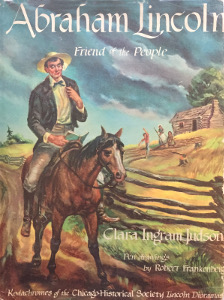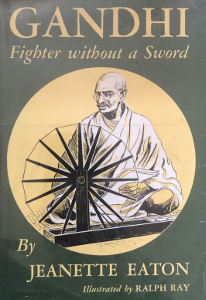< Newbery Medal and Honor Books
Given the Newbery Award's prestige it would be easy to assume that the award winners are all excellent books for children. The Biblioguides Team has not found this to be the case. We always want to provide parents with the information they need to make the best book decisions for their families. With that goal in mind, we've put together a complete list of all medal winners and honor books since inception, and the Biblioguides Review Team is working together to read our way through the winners and to provide a review. Where we have not yet reviewed a book, a description directly from the dust jacket or from the publisher has been provided. In some cases, we have shared a brief synopsis from The Newbery and Caldecott Awards: A Guide to the Medal and Honor Books (1999).
Reviews are the thoughts and opinions of the particular reviewer and do not necessarily represent all members of the team. Reviews will continue to be added as the team reads more of the Newbery books. We hope this list will help you familiarize yourself with the various winners and provide the necessary information to determine which books would be a good fit for your family!
Amos Fortune: Free Man
By: Elizabeth Yates
Illustrated by: Nora S. Unwin
Medal Winner
Reviewed by: Sara Masarik
Also read and recommended by: Diane Pendergraft, Sandy Hall, Sherry Early
This book is incredible. The writing is of the highest quality. The storytelling is utterly compelling. The story itself is exceptionally interesting and inspiring. And, it beautifully straddles the line between history and hagiography. This is the kind of book that young people should read for many reasons. An absolute classic, I am left with only one question: Why didn’t I know anything about it until I was in my 40s?
Read full reviewAbraham Lincoln: Friend of the People
By: Clara Ingram Judson
Illustrated by: Robert Frankenberg
Honor
NOT REVIEWED
Clara Ingram Judson began her journey into the Lincoln country at Knob Creek Farm, a beautiful spot in the heart of Kentucky's knobby hills. Here Abraham Lincoln himself located his first recollections of childhood. Here, too, Mrs. Judson begins her story.
The author visited the site of the school house which Abe attended. She saw the farm he and his father planted. Following the way of the Lincoln family westward, she came to Illinois and to New Salem, and took the trail on to Springfield that Lincoln himself walked countless times.
"All this travel through Lincoln country is rewarding," writes Mrs. Judson. "But a deeper knowledge of the man comes through solitary study of the written word. I have searched through countless newspapers; I have carefully read over two hundred books; and dipped into scores of others for research on details..."
The result is a rich and satisfying biography of the prairie president, based on the most up-to-date and accurate sources of information. Here is the real Lincoln—in his gauntness, his gawkiness, and his greatness—the backwoods boy who became President and saved the Union.
From the dust jacket
Better Known as Johnny Appleseed
By: Mabel Leigh Hunt
Illustrated by: James Daughterty
Honor
NOT REVIEWED
Johnny Appleseed has been the subject of many books, but he has never had the interpretation to match Mabel Leigh Hunt's in understanding of his character, and integrity of purpose, and in charm and warmth of writing.
While Johnny Appleseed's tradition is a part of our national heritage, it is particularly fitting that a Midwest author should write amply of him, since he spent his entire adult life planting throughout the Midwest, and found welcome in every pioneer cabin of that region. Mabel Leigh Hunt, through all her successful years of authorship, has cherished the purpose of writing the story of this famous figure of history and legend. Out of her search for facts, out of her respect for traditions, out of her deep feelings for Johnny himself, she wanted to answer, as truthfully as possible, that oft-asked query, "Was Johnny Appleseed a real man?"
This book, then, is the result of a conscientious student's long research and a creator's art. It contains the few biographical truths known of Johnny's life, and the legends which have truth in them because they flower from truth. And because the author wished to make legend and fact, characters, period and scene vivid and alive to readers, she employs a device of presenting the major parts of Johnny's life in nine stories, each named for a variety of apple which Johnny may have planted in the Midwest river valleys. Each story takes him westward through the years, from the Youghioheny to the Mississippi. The whole account creates a pageant, rich and memorable.
From the dust jacket
Gandhi: Fighter Without a Sword
By: Jeanette Eaton
Illustrated by: Ralph Ray
Honor
NOT REVIEWED
Mohandas Gandhi, one of the world's greatest figures, has already become a legend. In this book Jeanette Eaton shows him as a human being.
While still a young man, Gandhi adopted the austere way of living that was his until the day he died. He did not want comforts and luxuries when so many of his countrymen lived in terrible poverty. He ate only the most frugal diet and in his later years wore a peasant's costume. But he himself was anything but austere. Laughter was to him life's most healing gift, even when it was directed against himself. Once he appeared before the king of England in his famous cotton robe and loincloth, and later told an anxious friend that it was all right, because the king wore clothes enough for two.
It was in South Africa that he first became the champion of countless thousands of downtrodden Indian workers. Mahatma, the name by which he became known all over the world, means Great Soul. Gandhi's greatness of soul manifested itself in every deed. He forgave those who injured him. He took Untouchables into his own home as part of his effort to abolish the evil custom which made outcasts of millions of Indians. He tried to unite Hindus and Mohammedans. He labored to free India from the English and died a martyr's death, after having given humanity an unforgettable lesson in brotherhood and peace.
In Jeanette Eaton, Gandhi has a worthy biographer. In her luminous book he lives again as hero, saint, and man.
From the dust jacket






